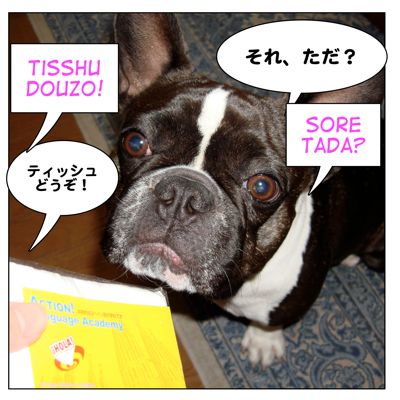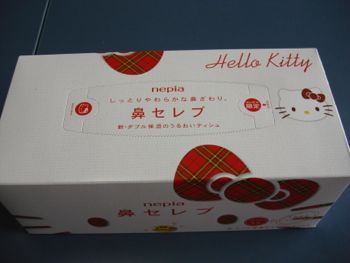![]() 「テッシュどうぞ!」
「テッシュどうぞ!」
= Tisshu douzo!
=“Here’s tissue for you!”
:maggie-small: 「それただ?」
= Sore tada?
= “Is it free?”
Hi everyone!
Recently everyone in Japan is talking about 花粉症( = kafunshou) pollen allergy, hay fever.
People ask each other how’s アレルギー ( = arerugii) allergy or 花粉症 ( = kafunshou) pollen allergy, hay fever :
:u:
*「今年は、花粉症はどう?」(casual)
= Kotoshi wa kafunshou wa dou?
= “How’s your pollen allergy this year?”
*「もうかなりきてるよ〜!」(casual)
= Mou kanari kiteruyoo
= “It is already pretty bad.”
*「年々、花粉症がひどくなってきています。」
= Nennen kafunshou ga hidokunatte kiteimasu.
= “It’s getting worse every year.”
*「今年は花粉の量がかなり多いみたいですね。」
= Kotoshi wa kafun no ryou ga kanari ooi mitai desune.
= “I have heard that the amount of pollen out there this year is pretty high.”
In 天気予報 ( = tenki yohou) ,weather report, also forecasts 花粉情報 ( = kafunjouhou), pollen forecast in spring.
They said 花粉症 ( = kafunshou) pollen allergy, hay fever is mainly caused by 杉/スギ ( = sugi) Japanese cedar, so we also call it スギ花粉症( = sugi kafunshou) pollen allergy caused by Japanese cedar.
People complain about:
• 目のかゆみ ( = me no kayumi) eye itchiness
•くしゃみ ( = kushami) sneezing
• 鼻水 ( = hanamizu) runny nose
• 涙目 ( = namida me) teary eye
• 鼻がくしゅくしゅする ( = hana ga kushukushu suru) having a light runny nose or light sneezing.
•くしゃみがとまらない。 ( = kushami ga tomaranai)
Note : By the way do you know the sneezing sound in Japanese?
!nemui! Big sneeze :
![]() はくしょん/ハクション ( = hakushon)or
はくしょん/ハクション ( = hakushon)or
![]() はっくしょん/ハックション ( = hakkushon)
はっくしょん/ハックション ( = hakkushon)
Middle size sneeze :
![]() くっしゃん/クッシャン ( = kusshan)
くっしゃん/クッシャン ( = kusshan)
Little sneeze :
![]() くしゅん/クシュン ( = kushun)
くしゅん/クシュン ( = kushun)
(We don’t say “Bless you” in Japanese. If someone is keep sneezing, we might say
大丈夫(ですか)? ( = Daijoubu desuka?) Are you all right?
風邪(ですか)? ( = Kaze desuka) Do you have a cold? or
アレルギー(ですか?)( = Arerugii desuka?) Do you have an allergy?)
*desuka→more polite
How about a runny nose? There is no actual sound of a runny nose but we describe it with ずるずる/ズルズル ( = zuruzuru) or だらだら/ダラダラ(=daradara) when you have a continuous runny nose.
• 鼻水がずるずる出る。
= hanamizu ga zuruzuru deru
If you feel something in your eyes,
• 目がゴロゴロする。
= Mega gorogoro suru
If your eyes are irritated you can also say,
• 目がチカチカする。
= Mega chikachika suru.
*************************************************************************
OK, today, I want to try something new. I will make a lesson out of “pocket tissue” (tissue in a small package) (Whaaaat!? :shock: ) with lots of sound files so that you can practice listening!
You can use this lesson in two or three ways.
First if your listening level is good enough, just listen to the sound file and see if you understand the whole thing.
For those whose listening level is not that good but are good at reading, read the following text first to see if you understand it.
And those who are not confident neither reading nor listening, I still love you! ♥ :D
We’ll break down the lesson and study little by little. The goal is to understand the whole text without reading the text.
*************************************************************************
ポケットテッシュ
日本では、街角でよくポケットティッシュを無料で配っています。よく見るとティッシュには広告が入っています。
キャンディーを一粒、ちらしに添えて配ることもあります。ちらしに物を付けることで道行く人々が受け取ってくれる可能性も高くなります。
素通りする人もいますが、中には前を何回も通ってティッシュを沢山もらう人もいるみたいです。
私のバッグや家にもこうしてもらったポケットティッシュがいくつもあります。だから日本ではわざわざポケットティシュを買うことは稀です。
ティッシュをただでもらい慣れているのでたまに外国に行くとポケットティッシュをお店で買わなければならないのは不思議な気さえします。
*************************************************************************
Poketto tisshu
Nihon dewa machikado de yoku poketto tisshu wo muryou de kubatte imasu.
Yoku miruto tissu niwa koukoku ga haitte imasu.
Kyandii wo hitotsubu chirashi ni soete kubaru koto mo arimasu.
Chirashi ni mono wo tsukeru koto de michiyuku hitobito ga uketotte kureru kanousei mo takaku narimasu.
Sudoori suru hito mo imasu ga naka niwa mae wo nankai mo tootte tisshu wo takusan morau hito mo iru mitai desu. Watashi no baggu ya ie ni mo koushite moratta tissu ga ikutsu mo arimasu. Dakara nihon dewa wazawaza poketto tisshu wo kaukoto wa mare desu.
Tisshu wo tada de morai narete iru node tama ni gaikoku ni iku to poketto tisshu wo omise de kawanakereba naranai nowa fushigi na ki sae shimasu.
:u:
•ポケットテッシュ ( = poketto tisshu)
日本では、街角でよくポケットティッシュを無料で配っています。
= Nihon dewa machikado de yoku poketto tisshu wo muryou de kubatte imasu.
• 街角 ( = machikado) on the street
• ポケットティッシュ ( = poketto tissu) pocket size (small size) tissue
• よく ( = yoku) often
• 無料で ( = muryou de) free of charge, gratis
• 配る ( = kubaru) hand out,
• 無料で配る ( = muryou de kubaru) to give away
:i: (Note : Sorry! But I will omit particles in this lesson!)
![]() In Japan it is quite common to give away pocket tissue (pocket size tissue) on the street.
In Japan it is quite common to give away pocket tissue (pocket size tissue) on the street.
よく見るとティッシュには広告が入っています。
= Yoku miru to tisshu niwa koukoku ga haitte imasu.
•よく見ると ( = yoku miruto) if you look at it carefully
• 広告 ( = koukoku) advertisement
•入っている ( = haitteiru) to contain, to be in, to have in…
![]() If you see them carefully you can find advertisement in the tissue.
If you see them carefully you can find advertisement in the tissue.
キャンディーを一粒、ちらしに添えて配ることもあります。
= Kyandii wo hitotsubu chirashi ni soete kubaru koto mo arimasu.
•一粒 ( = hitotubu) one piece of
•ちらし ( = chirashi) flier
•添える ( = soeru) attach
•こともある ( = kotomo aru) There are cases that…
![]() Sometimes they attach a piece of candy to a flier and hand them out.
Sometimes they attach a piece of candy to a flier and hand them out.
ちらしに物を付けることで
= Chirashi ni mono wo tsukeru koto de
• 物をつける ( = mono wo tsukeru) to add/attach things to…
•ことで ( = koto de) by doing something
![]() By adding something to the flier,
By adding something to the flier,
道行く人々が受け取ってくれる可能性も高くなります。
= Michiyuku hitobito ga uketotte kureru kanousei mo takaku narimasu.
•道行く人々 ( = michiyuku hitobito) people who pass by, passers-by
•受け取ってくれる ( = uketotte kureru) would receive
•可能性 ( = kanousei) possibility
•高くなる ( = takaku naru) get higher
![]() there is a higher possibility that passers-by will receive the flier.
there is a higher possibility that passers-by will receive the flier.
素通りする人もいますが、( = sudouri suru hito mo imasu ga)
• 素通りする ( = sudouri suru) to pass by somewhere without stopping / saying hello to someone
• 人もいます( = hito mo imasu) there are people
![]() There are people who just pass by the people handing out tissues without receiving (ignoring) tissues, but
There are people who just pass by the people handing out tissues without receiving (ignoring) tissues, but
中には前を何回も通って ( = naka niwa mae wo nankai mo tootte)
•中には ( = naka niwa) some
•何回も ( = nankai mo) many times, several times, some times, a couple of times
•通る ( = tooru) to pass by
ティッシュを沢山もらう人もいるみたいです。
= Tisshu wo takusan morau hito mo iru mitai desu.
![]() I’ ve heard there are some people who get a couple of tissues by passing by the person who give the tissue away many times.
I’ ve heard there are some people who get a couple of tissues by passing by the person who give the tissue away many times.
•〜を沢山 ( = takusan) a lot, many
•みたいです ( = mitai desu) it seems like, they say, I have heard that
私のバッグや家にも ( = watashi no baggu ya ie ni mo)
![]() Also in my bag and a house
Also in my bag and a house
こうしてもらったポケットティッシュがいくつもあります。
= Koushite moratta poketto tisshu wo ga ikutsumo arimasu.
•こうして ( = koushite) like this, this way
•もらった ( = moratta) have received
•いくつもあります ( = ikutsumo arimasu.) there are some/several
![]() *there are some tissues that I have received like that.
*there are some tissues that I have received like that.
だから日本ではわざわざポケットティシュを買うことは稀です。
= Dakara nihon dewa wazawaza poketto tisshu wo kau koto wa mare desu.
•だから ( = dakara) that is why
•わざわざ ( = wazawaza) go to the trouble to do something
•稀 ( = mare) rare
![]() *That is why it is very rare to go buy pocket tissue in Japan
*That is why it is very rare to go buy pocket tissue in Japan
ティッシュをただでもらい慣れているので
= Tisshu wo tada de morai narete iru node
•ただで ( = tada de) free of charge, gratis
•もらう ( = morau) receive
•慣れる ( = nareru) to get used to
•もらい慣れる ( = morai nareru) to get used to receiving
Since we get used to getting them free,
たまに外国に行くと
= Tama ni gaikoku ni ikuto
•たまに ( = tamani) once in a while, occasionally
•外国 ( = gaikoku) foreign countries, abroad
•行くと ( = ikuto) when going to
![]() when we go abroad occasionally
when we go abroad occasionally
ポケットティッシュをお店で買わなければならないのは
= Poketto tisshu wo omise de kawanakereba naranai nowa
•お店で ( = omise de) at a store
•買わなければならない ( = kawanakereba naranai) have to buy
![]() To buy a pocket tissue at a store
To buy a pocket tissue at a store
不思議な気さえします。
= Fushigi na ki sae shimasu.
•不思議 ( = fushigi) strange, unnaturla, wonder
•気がする ( = kiga suru) to feel
•不思議な気さえする ( = fushigi na ki sae suru) feel even unnatural, feel even strange
![]() makes me feel even strange.
makes me feel even strange.
:l: Culture Note:
風邪の季節や花粉症の季節になると人々はティッシュが手放せません。
よく鼻をかむ人の為にメーカーもより質の高いティッシュを開発しています。
例えばこちら!特定のコンビニだけで買えるハローキティーの箱入りティッシュです。
*************************************************************************
= Kaze no kisetu ya kafunshou no kisetu ni naru to hitobito wa tisshu ga tebanasemasen.
yoku hana wo kamu hito no tame ni meikaa mo yori shitsu no takai tisshu wo kaihatsu shite imasu.
tatoeba kochira! tokutei no konbini dake de kaeru harou kittii no hakoiri tisshu desu.
:u:
風邪の季節や花粉症の季節になると
= Kaze no kisetu ya kafunshou no kisetu ni naru to
•風邪 ( = kaze) cold
•季節 ( = kisetsu) season
•や ( = ya) ~ and etc.
•花粉症 ( = kafunshou) pollen allergy, hay fever
•なると ( = naruto) When we get in / we are/ it turns into
![]() When we are in a season of cold and hay fever,
When we are in a season of cold and hay fever,
人々はティッシュが手放せません。
= Hitobito wa tisshu ga tebanasemasen.)
• 人々 ( = hitobiito) people
• 手放せない ( = tebanasenai) not be able to do without
![]() we can’t do without tissue.
we can’t do without tissue.
よく鼻をかむ人の為にメーカーも
= Yoku hana wo kamu hito no tame ni meikaa mo)
• よく ( = yoku) often
• 鼻をかむ ( = hana wo kamu) to blow one’s nose
• 為に ( = tameni) for, targeting
• メーカー ( = meikaa) makers
![]() For people who blow nose often, makers
For people who blow nose often, makers
より質の高いティッシュを開発しています。
= Yori shitsu no takai tisshu wo kaihatsu shite imasu.)
• より ( = yori) even more
• 質 ( = shitsu) quality
• 高い ( = takai) hight, superior
• 開発する ( = kaihatsu suru) to develop
• 開発している ( = kaihatsu shiteiru) to have been developing
![]() *have developed even higher quality of tissue.
*have developed even higher quality of tissue.
例えばこちら!
=Tatoeba kochira!
• 例えば ( = tatoeba) for example
• こちら( = kochira) this one
![]() For example, this one!
For example, this one!
特定のコンビニだけで買える
= Tokutei no konbini dake de kaeru
• 特定 ( = tokutei) specific, limited
• コンビニ( = konbini) a convenience store
![]() You can only get in a limited convenience store,
You can only get in a limited convenience store,
ハローキティーの箱入りティッシュです。
= Harou kittii no hakoiri tisshu desu.
• ハローキティー ( = harrou kittii) Hello Kitty
• 箱 ( = hako) a box
• 入り ( = iri) to be in
• 箱入り ( = hako iri) boxed
• 袋入り( = fukuro iri) in a bag
![]() Hello Kitty boxed tissue.
Hello Kitty boxed tissue.
OK, now do you want to try to read what it says on the box?
•鼻セレブ ( = hanaserebu) It’s a coined word which came from
鼻 ( = hana) nose
セレブ ( = serebu) celebrity
We have lots of “creative” product names.
•新ダブル保湿のうるおいティッシュ ( = shin daburu hoshitsu no uruoi tisshu)
• 新 ( = shin) new
• ダブル ( = daburu) double
• 保湿の ( = hoshitsuno) moisturizing
• うるおい ( = uruoi) moisturizing
verb うるおう(=uruoi)
• 肌がうるおう ( = hada ga uruou) to hydrate the skin
• 喉をうるおす ( = nodo wo uruosu) to drink something to ease your thirst
• しっとりとらかな鼻ざわり ( = shittori to yawarakana hanazawarari)
• しっとり ( = shittori) moist
• 柔らか ( = yawaraka) soft
• さわり ( = sawari) touching feeling
• 肌触り ( = hada zawari) feel soft for your skin
Ex. このセーターは肌ざわりがいい
= Kono seetaa wa hadazawari ga ii.
= This sweater feels good.
•コンビニ限定 ( = konbini gentei) Only be able to purchase at convenience stores
•限定 ( = gentei) limited
•ハワイ限定商品 ( = hawai gentei shouhin) Products that can only purchased in Hawaii.
:maggie-small: From the picture above;
*「テッシュどうぞ!」( = tisshu douzo!)
“Here’s tissue for you!”
When you serve something, you say 〜どうぞ!(= douzo!)
It means “please” or “Here you are!”
Ex. お茶どうぞ! ( = ocha douzo!) Please enjoy your tea.
Ex. タバコどうぞ! ( = tabako douzo!) Have a cigarette.
*「それただ/タダ?」( = sore tada?)
(←それはただ(タダ)ですか? (casual)
= Sore wa tada desu ka?))
= “Is it free?”
それ ( = sore) means “it”
ただ/タダ ( = tada) “free” “no charge” (casual)
→ synonym : 無料 ( = muryou)
→無料配布 ( = muryou haifu) give away for free
 マギー先生より =Maggie sensei yori = From Maggie-sensei
マギー先生より =Maggie sensei yori = From Maggie-sensei
この鼻セレブって使うとセレブになれるのかしら???
= Kono hana serebu tte tsukau to serebu ni nareru no kashira???
= So I wonder if I will be a celebrity if I use this “hana serebu” (=”Nose Celebrity”) ???
***
Will you be my Patron?
I appreciate your support! サポートありがとう!





14 Comments
鼻をかむのがマナー違反だということは知ってるんだが、いざとなれば、どうやればいいのか。
@Cygnus
人から離れてこっそりね!でもいつもそうはしてられないですよね。 :)
wow!!先生、お疲れ様!!m(_ _)m
so are Japanese people more sensitive to pollen than us? Cause where I live it’s country side with a really high concentration of pollen but I don’t know that many people who got trouble with it… but you know when I first moved here I had a terrible pollen allergy for a month or so (runny nose, teary eyes, everything!!) after that never again ^^
and u notice how differnt people sneeze differently? it’s the funniest thing でしょ!!?I think I sneeze くっしゃん and I usually sneeze 2 times, I noticed… what about sensei? :)
@Aki
You are very lucky that you don’t suffer from pollen allergy anymore. It is just miserable.
くしゃみ? You have seen my superstitious lesson, right? If you sneeze twice, we think someone is talking about you.
はあ〜〜〜っくしょん!
今日はMaggie先生
そうですね、私の間違いが沢山ありました。。いろいろ添削くれて有り難う。
一杯文章を書いて、そして周りに誰か直してくれる人がいるといいですね。
~それはいいんですけど、問題は周りに誰か直せる人はいません。。
家には日本語ができるのは私しかいませんから。。昨年日本語センターで中級日本語に卒業したから、自分で勉強続けていましたけど、日本語を指導の先生はいなかったら、やっぱり難しいです。
だからMaggie先生のWebsiteを見つけた時、本当に嬉しいです。
本当に大変助かりました (今度は正しく書けましたかな)
どうやって分かれますか?→?? 「どう違いますか?」 かな?
~How do you differentiateと言いたいですが。。
よかったらもう一回、”~してくれる、あげる”のレッスン勉強してみてね
~はい、そうします
LadySapphireさん
周りに日本語を話す人がいないのにLasySapphireさんの日本語は本当に上手ですね。このブログは日本語が上手になる為の応援サイトなので時間がある限り出来るだけ添削しますのでまたいつでもコメント下さいね。
今日の文章もうまく書けてますよ〜!その調子!
(Note : 書けましたかな→書けたかな?
日本語を指導の先生は→日本語を指導してくれる先生は
本当に嬉しいです→(past tense)嬉しかったです。)
Hi Maggie先生
お返事くれてありがとう
そうですね。どこかで聞いた、日本には今春だけど、少し雪も降っていたことがある。今までですか?
ここのフィリピンでは今暑いです、いや、とても暑いです。 暑さのせいで怠ける気がします。。 なんかなにもしたくない気がして、すこし動きさえすればすぐ汗をかくようです。
最近の電気Bill(Electric bill?)高くなってきてまずいです。
エアコンをほとんどいつも使ってるから、その上、Meralcoは(ここのElectric distributor)電気使いの費を高くされた。なんかBad Timingでしょ
又先生の添削してくれてありがとう。
助詞についてまだある時ちょっとConfusedしています(Confusedはどういいますか?)
例えば私のそのコメントの間違い。
花粉症に心配されます。→花粉症が心配されます。
上の二つの文章は、私にとってなんか意味が同じみたい。
正しい助詞と間違い助詞はどうやって分かれますか?
そして動詞についても、日本語では複雑だとおもう。でも同時に面白いとおもいます。
なんの適当な助詞を使うのはどう分かれますか?
いい方法があったら是非教えてくれておねがいします。
LadySapphireさん
そうですか、フィリピン、暑そうですね。
助詞は本当にちょっとのことだけれども別のものを使うと意味が変わってくるものもあって複雑ですね。また今度機会があったら助詞のレッスンを作りますが、まずはLadySapphireさんの様に一杯文章を書いて、そして周りに誰か直してくれる人がいるといいですね。直されないと間違っていると気がつかずにずっと使ってしまうから癖(くせ)になってしまうかもしれません。ここで直したことはメモとかとって覚えてね。
助詞だけ勉強するよりも動詞や他の品詞と一緒に文章で覚えるといいですよ! ex. 勉強をする あなたに会いたい 学校に行く..etc.
花粉症に心配されます。→「〜に心配される」を訳すとto be worried by “花粉症”という意味になってしまいます。「心配する」という動詞は目的語がいるので(目的語)を心配するで”to worry about something”という文章になります。
(Note : どこかで聞いた、日本には今春だけど、少し雪も降っていたことがある。→(word order) 日本は今、春だけど、少し雪も降っていたことがあるとどこかで聞きました。
今までですか?→You mean “until now?” ? 今も(ずっと)そうですか?
ここのフィリピンは→ここフィリピンは
怠ける気がします→feel lazy? 「だらだらしてしまいます。」ではどうかな?
すこし動きさえすれば→少し動くだけで
電気Bill/電気使いの費→電気代 (または”光熱費”)
その上、Mは”電気代”を高くされた→”された”は受け身です。もし受け身にしたければMに電気代を値上げされました。
Bad Timing→タイミング悪いでしょ。
又先生の添削してくれてありがとう。→又先生、添削してくれてありがとう。(”の”はいらないですよ。)
どうやって分かれますか?→?? 「どう違いますか?」 かな?
なんの適当な助詞を使うのはどう分かれますか?→適切な助詞をどう使えばいいですか?
是非教えてくれておねがいします。→是非教えて下さい。)
一杯、直しちゃいましたがそれだけLadySapphireさんの日本語のレベルが高いってことですよ。
よかったらもう一回、”~してくれる、あげる”のレッスン勉強してみてね。
Hi Maggie先生
その鼻セレブっていいティッシュみたいですね。
私もティッシュが手放せないひとです。よく風邪をひくんだから。
今は日本で春でしょう?春の時に日本へ行きたいけど、私のように風邪をひきやすい人にとって、花粉症に心配されます。
Maggie先生はどう思いますか?花粉症に当てられる可能性は高いかな。。
(もし文章になにか間違いがあったら又先生に添削してくれてお願いします、どうも)
LadySapphireさん
今日は!日本はまだまだ花粉症の季節です!周りの人も皆、ぐすぐすしています。風邪と花粉症はちょっと違うから、心配しないで是非、桜の季節の春に日本に来て下さい。
今春は気候がおかしくてとっても寒い春になりましたが…フィリピンはいつも暑いのかな?
(Note : よく風邪をひくんだから。→よく風邪をくから…
花粉症に心配されます。→花粉症が心配されます。
花粉症に当てられる→花粉症にかかる
又先生に添削してくれてお願いしますどうも)→また、先生、添削して下さい。お願いします。)
今日もよく出来ました〜!!
WOW! You have put in a lot of work in your posts. Those aimai expressions alway come up in the JLPT. I wonder how difficult the new level 3 will be???
JLPT5-san
”絶対一発合格!”がんばって下さい!
Hi Maggie ^_^
This was a great lesson. I couldn’t understand all of the passage the first time but then I went through it bit by bit and it all made sense! This lesson really helped my confidence, so thank you. :) I also like how it is so practical and about every day things.
I have a cold right now… I wish I had some 鼻セレブ tissues. I tried them when I was in Japan and they were heaven for my sore nose!
Hello Amanda!!
久しぶり!Great to hear from you again!
Now you are an expert of “鼻セレブ!!!
風邪、早く治してね!